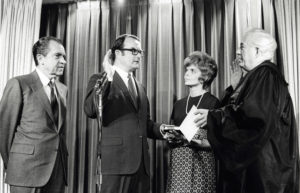The legacy of William Ruckelshaus

William Ruckelshaus takes the oath of office as EPA’s first administrator.
William Ruckelshaus will be remembered as the deputy attorney general who defied President Richard Nixon and refused to fire Watergate special prosecutor Archibald Cox in October 1973.
Ruckelshaus, who died Wednesday at his Seattle-area home, made a more lasting contribution when Nixon appointed him as the first administrator of the Environmental Protection Agency in December 1970.
Erik Robinson, a former Columbian reporter who spent 12 years covering the environment for the paper, interviewed Ruckelshaus at least a couple of times.
Robinson — once a reporter, always a reporter — saved his notes from one of his interviews, which he believed was in 2007, for a story on Columbia River pollution. He shared some of that content in an email to The Columbian.
Ruckelshaus, a lifelong Republican, saw the environment as an issue that transcended partisan politics.
He was passionate about the environment and knew that cleaning up Puget Sound or the Columbia River, each draining massive watersheds, required rallying individuals to do the right thing, Robinson wrote in his email.
“The truth is there are not enough lawyers in Puget Sound to force all these people,” Ruckelshaus said during the interview. “You need to get all the people together who live in that watershed, acquaint them with the problem, and get them to make the commitment necessary to reduce those causes.”
Ruckelshaus also understood the role of regulation.
“The people upstream will always pooh-pooh what the downstream people think,” he told Robinson. “That’s why you need rules so as to assure that health and environmental protection is enjoyed by everybody.”
Nixon, a president far more interested in foreign policy than domestic affairs, signed many of the nation’s landmark environmental laws, including the Clean Water Act, the Endangered Species Act and the National Environmental Policy Act.
When Robinson spoke with Ruckelshaus, it had been 35 years since the Clean Water Act became federal law. The former EPA administrator was gratified that point sources, or pipes dumping pollution directly into waterways, had been largely eliminated in the United States.
“If you go back 35 years, we’ve made a lot of progress against the pollutants that led to the creation of EPA in the first place,” he said during the interview. “We had flammable rivers in Cleveland. What we’ve not been as good at is addressing the nonpoint source pollution problems.”
Today, the biggest threat to waterways in urban areas comes from a more ubiquitous source: polluted storm runoff containing oil, fertilizers, pet waste, metals and other contaminants from everyday human life.
In 1983, Ruckelshaus returned to lead the EPA for a second time after the agency’s budget and regulatory enforcement had been gutted by his predecessor, Anne Gorsuch, who earned the nickname “Ice Queen” and whose son, Neil Gorsuch, was appointed to the U.S. Supreme Court in 2017. Demoralized EPA employees were thrilled to have their old boss back, including one who held a sign saying, “How do you spell relief? Ruckelshaus.”
Robinson said Ruckelshaus struck him as a man brimming with optimism, a perspective that could be useful for addressing longtime contamination problems in Vancouver Lake.
“I don’t think in the case of the Columbia or any waterway that these problems are so large or so daunting that there’s nothing we can do about it,” Ruckelshaus said during the interview.
